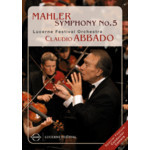
Mahler: Symphony No. 5 (recorded in 2004)
 $46.00
Out of Stock
$46.00
Out of Stock6+ weeks add to cart
GUSTAV MAHLER
Mahler: Symphony No. 5 (recorded in 2004)
Lucerne Festival Orchestra, Claudio Abbado
[ EuroArts DVD / DVD ]
Release Date: Saturday 10 September 2011
This item is currently out of stock. It may take 6 or more weeks to obtain from when you place your order as this is a specialist product.
 Suitable for General Audiences
Suitable for General Audiences
G - "If anything the mystery will be intensified as one watches Abbado apparently drawing exactly what he wants from well over a hundred musicians by some extra-sensory means. It is fascinating to watch."
MUSICWEB.CO.UK
G :-
All Regions - Widescreen 16:9 - PCM Stereo / Dolby Digital 5.1 Surround / DTS 5.1 Surround - Colour - 84 Minutes - NTSC
"Performances of this quality do not come along very often. Such is the power of Abbado's performance that Part 1 (the first two movements) left me so moved I had to take a break before proceeding to the remaining two parts, or three movements. The majority of other performances I have heard have tended to structure the performance in three sections like this: (a) Trauermarsch, (b) Second Movement and Scherzo, (c) Adagietto and Rondo Finale. Mahler's own division has the first two movements as Part 1, the Scherzo as Part 2 and the Adagietto and Rondo as Part 3. This is the pattern that emerges from Abbado's performance on this disc. There is a minimum break after a shattering Trauermarsch but a full pause for genteel coughing at the start and finish of the Scherzo. The audience in the Lucerne Hall are as silent as one could wish during the music, allowing the huge dynamics of Abbado's hand-picked orchestra to tell. What other orchestra boasts members of an internationally renowned string quartet in its ranks plus a list of other orchestral luminaries from all over the world? The string section is not only very large but also play with a passion and unanimity that makes one feel privileged to hear them. There are countless details of phrasing and dynamics that could not be achieved by the conductor unless he knows his musicians understand. That they do understand is clear not only from their playing but from their expressions and from the frequency of their glances toward the conductor: an exemplar of unanimity. This being a film one can view Mahler's frequent requests for the woodwind and horns to raise their instruments, and view Abbado as he conducts from memory a score that, even by Mahler's standards, is hugely complex - the composer was still refining it at the very end of his life. It is a mystery to many concertgoers what a conductor actually does and I regret to say this riddle will not be solved by the present issue. If anything the mystery will be intensified as one watches Abbado apparently drawing exactly what he wants from well over a hundred musicians by some extra-sensory means. It is fascinating to watch."
MUSICWEB.CO.UK
"Claudio Abbado's Mahler Fifth is magnificent.
It helps that the band is the Lucerne Festival Orchestra, that most exalted of all ad hoc ensembles, rather than the Gustav Mahler Jugendorchester.
It does make a difference in Lucerne to have a raft of seasoned players joining the core contingent from the Mahler Chamber Orchestra. The visual dimension is stronger, too, with the option to switch to the so-called 'Conductor Camera' and experience Abbado from a player's perspective. If this strikes some readers as a gimmick I can only say that I welcome it as a natural use of the new medium.
Listen without the images, though, and it quickly becomes apparent that Abbado's previous, audio-only account (DG, subsequently revamped for SACD) is sonically superior, with greater hall ambience and less tendency for wind, brass and percussion to lose themselves in the mix. It's not as if the conductor's conception has changed a great deal. His Fifth has always displayed a tad less inner intensity than some of the great readings of the past but with compensating elegance and grace. Once again the famous Adagietto steals in with a magic inevitability that few have matched. Those with limited budgets might do well to consider Leonard Bernstein's Unitel Mahler cycle (though it represents quite a substantial single outlay - see below). That said, Abbado's music-making is as fine as you will find anywhere today and his admirers should be well satisfied." Gramophone Classical Music Guide, 2010
Claudio Abbado is undeniably the supreme Mahler conductor of our time.
Now he conducts the composer's Fifth and most popular Symphony which became world-famous as the soundtrack to Visconti's "Death in Venice".
The Lucerne Festival Orchestra has set new standards in the field of classical music with the participation of great soloists at the orchestra's first desks, e.g. clarinetist Sabine Meyer, oboist Albrecht Mayer, violist Wolfram Christ, cellist Natalia Gutman and the Hagen Quartet
Brand new recording - state-of-the-art quality.